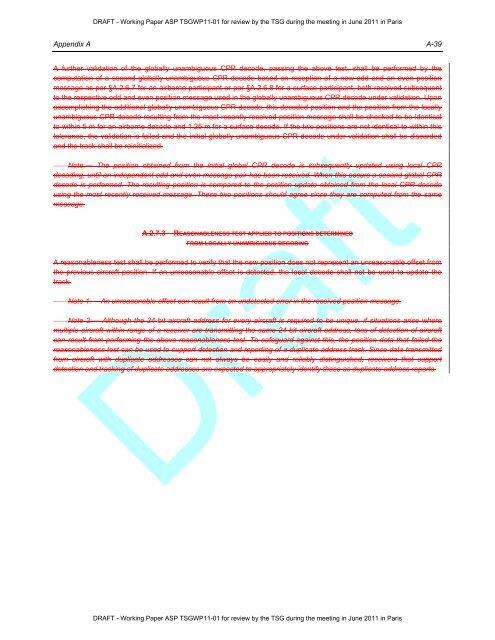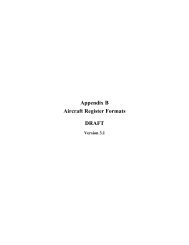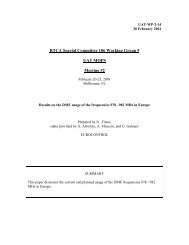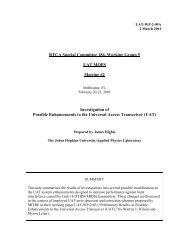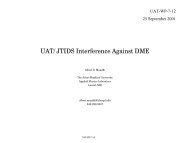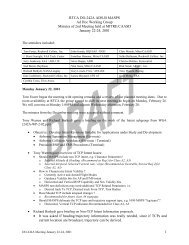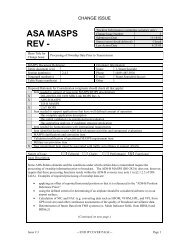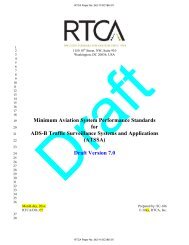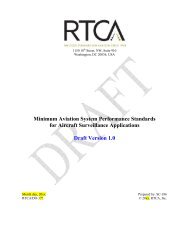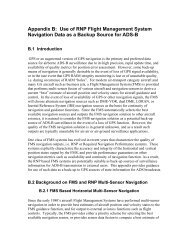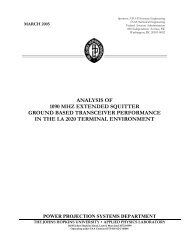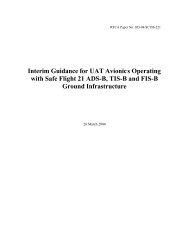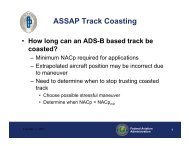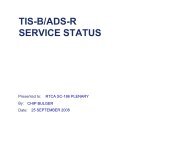- Page 1 and 2:
DRAFT - Working Paper ASP TSGWP11-0
- Page 3 and 4:
DRAFT - Working Paper ASP TSGWP11-0
- Page 5 and 6:
DRAFT - Working Paper ASP TSGWP11-0
- Page 7 and 8:
DRAFT - Working Paper ASP TSGWP11-0
- Page 9 and 10:
DRAFT - Working Paper ASP TSGWP11-0
- Page 11 and 12: DRAFT - Working Paper ASP TSGWP11-0
- Page 13 and 14: DRAFT - Working Paper ASP TSGWP11-0
- Page 15 and 16: DRAFT - Working Paper ASP TSGWP11-0
- Page 17 and 18: DRAFT - Working Paper ASP TSGWP11-0
- Page 19 and 20: DRAFT - Working Paper ASP TSGWP11-0
- Page 21 and 22: DRAFT - Working Paper ASP TSGWP11-0
- Page 23 and 24: DRAFT - Working Paper ASP TSGWP11-0
- Page 25 and 26: DRAFT - Working Paper ASP TSGWP11-0
- Page 27 and 28: DRAFT - Working Paper ASP TSGWP11-0
- Page 29 and 30: DRAFT - Working Paper ASP TSGWP11-0
- Page 31 and 32: Appendix A A-7 TYPE Code Format Hor
- Page 33 and 34: DRAFT - Working Paper ASP TSGWP11-0
- Page 35 and 36: DRAFT - Working Paper ASP TSGWP11-0
- Page 37 and 38: Appendix A A-13 The supersonic vers
- Page 39 and 40: Appendix A A-15 The transponder sha
- Page 41 and 42: DRAFT - Working Paper ASP TSGWP11-0
- Page 43 and 44: DRAFT - Working Paper ASP TSGWP11-0
- Page 45 and 46: DRAFT - Working Paper ASP TSGWP11-0
- Page 47 and 48: DRAFT - Working Paper ASP TSGWP11-0
- Page 49 and 50: DRAFT - Working Paper ASP TSGWP11-0
- Page 51 and 52: DRAFT - Working Paper ASP TSGWP11-0
- Page 53 and 54: DRAFT - Working Paper ASP TSGWP11-0
- Page 55 and 56: DRAFT - Working Paper ASP TSGWP11-0
- Page 57 and 58: DRAFT - Working Paper ASP TSGWP11-0
- Page 59 and 60: DRAFT - Working Paper ASP TSGWP11-0
- Page 61: DRAFT - Working Paper ASP TSGWP11-0
- Page 65 and 66: Appendix A A-41 MB FIELD DRAFT - Wo
- Page 67 and 68: Appendix A A-43 MB FIELD 1 MSB TRAN
- Page 69 and 70: Appendix A A-45 MB FIELD DRAFT - Wo
- Page 71 and 72: Appendix A A-47 MB FIELD 1 2 3 4 5
- Page 73 and 74: Appendix A A-49 MB FIELD DRAFT - Wo
- Page 75 and 76: DRAFT - Working Paper ASP TSGWP11-0
- Page 77 and 78: Appendix A A-53 MB FIELD DRAFT - Wo
- Page 79 and 80: Appendix A A-55 MB FIELD 1 BDS A,8
- Page 81 and 82: Appendix A A-57 MB FIELD DRAFT - Wo
- Page 83 and 84: Appendix A A-59 MB FIELD DRAFT - Wo
- Page 85 and 86: Appendix A A-61 MB FIELD DRAFT - Wo
- Page 87 and 88: Appendix A A-63 MB FIELD DRAFT - Wo
- Page 89 and 90: Appendix A A-65 MB FIELD DRAFT - Wo
- Page 91 and 92: Appendix A A-67 MB FIELD DRAFT - Wo
- Page 93 and 94: Appendix A A-69 MB FIELD DRAFT - Wo
- Page 95 and 96: Appendix A A-71 MB FIELD DRAFT - Wo
- Page 97 and 98: Appendix A A-73 MB FIELD DRAFT - Wo
- Page 99 and 100: Appendix A A-75 MB FIELD DRAFT - Wo
- Page 101 and 102: Appendix A A-77 MB FIELD DRAFT - Wo
- Page 103 and 104: Appendix A A-79 MB FIELD DRAFT - Wo
- Page 105 and 106: Appendix A A-81 MB FIELD DRAFT - Wo
- Page 107 and 108: Appendix A A-83 MB FIELD DRAFT - Wo
- Page 109 and 110: Appendix A A-85 MB FIELD DRAFT - Wo
- Page 111 and 112: Appendix A A-87 MB FIELD DRAFT - Wo
- Page 113 and 114:
Appendix A A-89 MB FIELD DRAFT - Wo
- Page 115 and 116:
DRAFT - Working Paper ASP TSGWP11-0
- Page 117 and 118:
DRAFT - Working Paper ASP TSGWP11-0
- Page 119 and 120:
DRAFT - Working Paper ASP TSGWP11-0
- Page 121 and 122:
Appendix A A-97 a) the PI sends a T
- Page 123 and 124:
Appendix A A-99 This subfield shall
- Page 125 and 126:
Appendix A A-101 These channels hav
- Page 127 and 128:
DRAFT - Working Paper ASP TSGWP11-0
- Page 129 and 130:
DRAFT - Working Paper ASP TSGWP11-0
- Page 131 and 132:
DRAFT - Working Paper ASP TSGWP11-0
- Page 133 and 134:
Appendix A A-109 A.4. MODE S BROADC
- Page 135 and 136:
Appendix A A-111 Note 1.— This st
- Page 137 and 138:
DRAFT - Working Paper ASP TSGWP11-0
- Page 139 and 140:
Appendix B B-3 TYPE code Subtype co
- Page 141 and 142:
DRAFT - Working Paper ASP TSGWP11-0
- Page 143 and 144:
DRAFT - Working Paper ASP TSGWP11-0
- Page 145 and 146:
DRAFT - Working Paper ASP TSGWP11-0
- Page 147 and 148:
DRAFT - Working Paper ASP TSGWP11-0
- Page 149 and 150:
DRAFT - Working Paper ASP TSGWP11-0
- Page 151 and 152:
DRAFT - Working Paper ASP TSGWP11-0
- Page 153 and 154:
Appendix B B-17 Coding (Binary) (De
- Page 155 and 156:
Appendix B B-19 a) ACAS operational
- Page 157 and 158:
Appendix B B-21 Subfield Coding: DR
- Page 159 and 160:
Appendix B B-23 Coding (Binary) (De
- Page 161 and 162:
DRAFT - Working Paper ASP TSGWP11-0
- Page 163 and 164:
DRAFT - Working Paper ASP TSGWP11-0
- Page 165 and 166:
DRAFT - Working Paper ASP TSGWP11-0
- Page 167 and 168:
DRAFT - Working Paper ASP TSGWP11-0
- Page 169 and 170:
Appendix B B-33 MB FIELD DRAFT - Wo
- Page 171 and 172:
Appendix B B-35 MB FIELD DRAFT - Wo
- Page 173 and 174:
Appendix B B-37 MB FIELD DRAFT - Wo
- Page 175 and 176:
Appendix B B-39 MB FIELD DRAFT - Wo
- Page 177 and 178:
Appendix B B-41 CF value ICAO/Mode
- Page 179 and 180:
DRAFT - Working Paper ASP TSGWP11-0
- Page 181 and 182:
Appendix B B-45 MB FIELD DRAFT - Wo
- Page 183 and 184:
DRAFT - Working Paper ASP TSGWP11-0
- Page 185 and 186:
Appendix B B-49 MB FIELD DRAFT - Wo
- Page 187 and 188:
DRAFT - Working Paper ASP TSGWP11-0
- Page 189 and 190:
DRAFT - Working Paper ASP TSGWP11-0
- Page 191 and 192:
DRAFT - Working Paper ASP TSGWP11-0
- Page 193 and 194:
Appendix C C-5 Table C-2. “TYPE
- Page 195 and 196:
DRAFT - Working Paper ASP TSGWP11-0
- Page 197 and 198:
DRAFT - Working Paper ASP TSGWP11-0
- Page 199 and 200:
Appendix C C-11 C.2.3.2.2 Time Sync
- Page 201 and 202:
DRAFT - Working Paper ASP TSGWP11-0
- Page 203 and 204:
DRAFT - Working Paper ASP TSGWP11-0
- Page 205 and 206:
DRAFT - Working Paper ASP TSGWP11-0
- Page 207 and 208:
DRAFT - Working Paper ASP TSGWP11-0
- Page 209 and 210:
DRAFT - Working Paper ASP TSGWP11-0
- Page 211 and 212:
DRAFT - Working Paper ASP TSGWP11-0
- Page 213 and 214:
Appendix C C-25 Notes.— DRAFT - W
- Page 215 and 216:
DRAFT - Working Paper ASP TSGWP11-0
- Page 217 and 218:
DRAFT - Working Paper ASP TSGWP11-0
- Page 219 and 220:
Msg Bit # “ME” Bit # Appendix C
- Page 221 and 222:
Appendix C C-33 Msg Bit # "ME” Bi
- Page 223 and 224:
DRAFT - Working Paper ASP TSGWP11-0
- Page 225 and 226:
DRAFT - Working Paper ASP TSGWP11-0
- Page 227 and 228:
Appendix C C-39 Notes.— DRAFT - W
- Page 229 and 230:
Appendix C C-41 Notes.— DRAFT - W
- Page 231 and 232:
Appendix C C-43 Notes. — DRAFT -
- Page 233 and 234:
DRAFT - Working Paper ASP TSGWP11-0
- Page 235 and 236:
DRAFT - Working Paper ASP TSGWP11-0
- Page 237 and 238:
DRAFT - Working Paper ASP TSGWP11-0
- Page 239 and 240:
Appendix C C-51 3. The decoded posi
- Page 241 and 242:
DRAFT - Working Paper ASP TSGWP11-0
- Page 243 and 244:
DRAFT - Working Paper ASP TSGWP11-0
- Page 245 and 246:
Appendix C C-57 B Reports to have k
- Page 247 and 248:
Appendix C C-59 Register 0516 DRAFT
- Page 249 and 250:
Appendix C C-61 Register 0716 DRAFT
- Page 251 and 252:
Appendix C C-63 Register 0916 DRAFT
- Page 253 and 254:
Appendix C C-65 Register 0A16 Figur
- Page 255 and 256:
DRAFT - Working Paper ASP TSGWP11-0
- Page 257 and 258:
Appendix C C-69 Register 6516 DRAFT
- Page 259 and 260:
Appendix C C-71 Table C-37. CF Fiel
- Page 261 and 262:
DRAFT - Working Paper ASP TSGWP11-0
- Page 263 and 264:
DRAFT - Working Paper ASP TSGWP11-0
- Page 265 and 266:
DRAFT - Working Paper ASP TSGWP11-0
- Page 267 and 268:
DRAFT - Working Paper ASP TSGWP11-0
- Page 269 and 270:
DRAFT - Working Paper ASP TSGWP11-0
- Page 271 and 272:
DRAFT - Working Paper ASP TSGWP11-0
- Page 273 and 274:
DRAFT - Working Paper ASP TSGWP11-0
- Page 275 and 276:
DRAFT - Working Paper ASP TSGWP11-0
- Page 277 and 278:
DRAFT - Working Paper ASP TSGWP11-0
- Page 279 and 280:
DRAFT - Working Paper ASP TSGWP11-0
- Page 281 and 282:
DRAFT - Working Paper ASP TSGWP11-0
- Page 283 and 284:
DRAFT - Working Paper ASP TSGWP11-0
- Page 285 and 286:
DRAFT - Working Paper ASP TSGWP11-0
- Page 287 and 288:
Appendix CD CD-3 ACTIONS EVENTS DRA
- Page 289 and 290:
DRAFT - Working Paper ASP TSGWP11-0
- Page 291 and 292:
Appendix CD CD-7 too many broadcast
- Page 293 and 294:
DRAFT - Working Paper ASP TSGWP11-0
- Page 295 and 296:
DRAFT - Working Paper ASP TSGWP11-0
- Page 297 and 298:
Appendix CD CD-13 CD.2.4.4.1.2 Poss
- Page 299 and 300:
Appendix CD CD-15 D.2.4.4.2.1.2 A32
- Page 301 and 302:
Appendix CD CD-17 AP/FD mode V/S-FP
- Page 303 and 304:
DRAFT - Working Paper ASP TSGWP11-0
- Page 305 and 306:
DRAFT - Working Paper ASP TSGWP11-0
- Page 307 and 308:
Appendix CD CD-23 CD.2.4.7.5 BINARY
- Page 309 and 310:
DRAFT - Working Paper ASP TSGWP11-0
- Page 311 and 312:
Appendix CD CD-27 Zone no. DRAFT -
- Page 313 and 314:
DRAFT - Working Paper ASP TSGWP11-0
- Page 315 and 316:
Appendix CD CD-31 CD.4 IMPLEMENTATI
- Page 317 and 318:
DRAFT - Working Paper ASP TSGWP11-0
- Page 319 and 320:
DRAFT - Working Paper ASP TSGWP11-0
- Page 321 and 322:
DRAFT - Working Paper ASP TSGWP11-0
- Page 323 and 324:
DRAFT - Working Paper ASP TSGWP11-0
- Page 325 and 326:
Appendix DE DE-7 c. for GNSS, the p
- Page 327 and 328:
Appendix DE DE-9 MB FIELD DRAFT - W
- Page 329 and 330:
Appendix DE DE-11 MB FIELD DRAFT -


